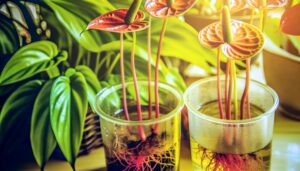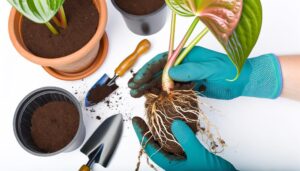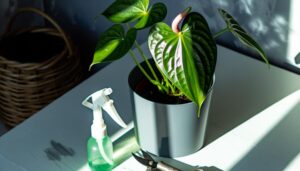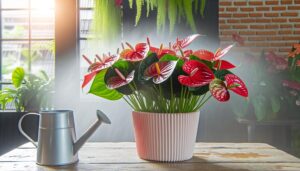The Best Soil for Anthuriums in the UK – A How-To Guide
To cultivate Anthuriums successfully in the UK, use a specialized soil mix for proper drainage, moisture retention, and aeration. Combine perlite or pumice for drainage, with peat moss or coconut coir for moisture retention.
Maintain a slightly acidic pH of 5.5 to 6.5 using materials like peat moss. This supports essential nutrient uptake.
Promote airflow to prevent root rot by incorporating orchid bark. Choose reputable brands like Miracle-Gro or Westland, ensuring they're suitable for Anthuriums.
Regular soil testing and careful repotting enhance plant health. By adjusting care seasonally, you'll optimize growth.
For detailed guidelines, there's more to explore.
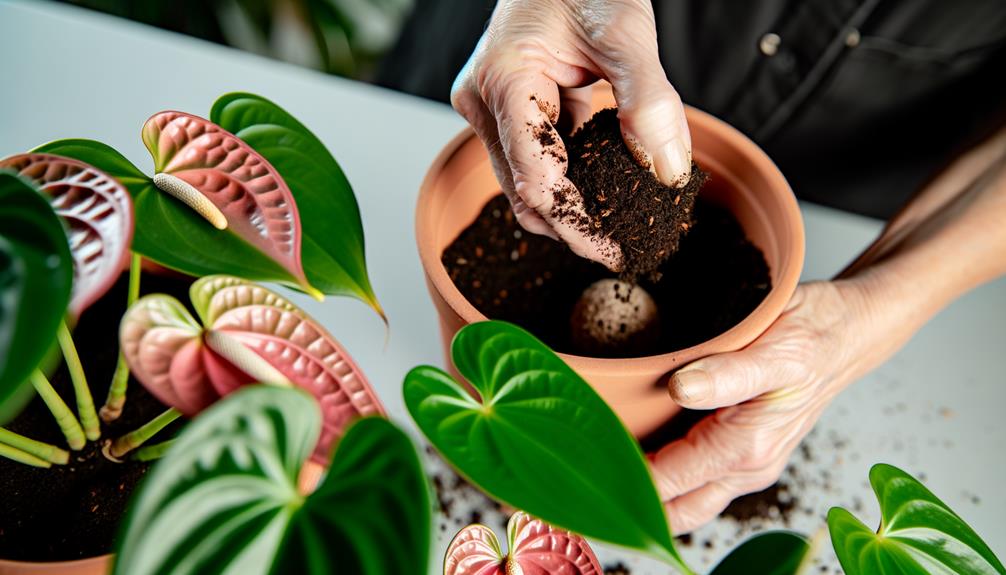
Key Takeaways
- Use a well-draining mix with materials like perlite and pine bark.
- Opt for a slightly acidic soil pH range of 5.5 to 6.5.
- Incorporate peat moss or coconut coir for moisture retention and aeration.
- Choose pre-mixed soils from brands like Miracle-Gro or BioBizz.
- Regularly test soil acidity and adjust using lime or sulfur as needed.
Understanding Anthurium Needs
Anthuriums require specific soil conditions that ensure proper drainage, aeration, and moisture retention to thrive in the UK climate. You should use a well-balanced mix that promotes water flow while retaining enough moisture to sustain root health.
Incorporate materials like perlite or pumice to enhance drainage and prevent waterlogging. Adding peat moss or coconut coir can improve moisture retention while maintaining aeration. Opt for a slightly acidic pH range of 5.5 to 6.5 to enable ideal nutrient uptake.
Avoid compacted soils as they restrict root growth and oxygen flow. Regularly check the soil's consistency and adjust the mix to maintain these conditions. Proper understanding and application of these soil characteristics are essential for your Anthurium's health and growth.
Soil Types Overview
To provide an ideal environment for your Anthuriums, let's examine various soil types and their specific properties that cater to the plant's unique needs.
Different soil types offer unique benefits, ensuring your Anthuriums thrive.
- Peat Moss: Retains moisture while providing necessary acidity.
- Pine Bark: Enhances drainage and mimics natural forest floor conditions.
- Perlite: Promotes aeration and prevents soil compaction.
- Coconut Coir: Offers excellent water retention and root support.
Importance of Aeration
You need to maintain adequate aeration in the soil to sustain peak root health for your anthuriums.
Adequate air flow prevents waterlogging, which can lead to root rot and other harmful issues.
Use a well-draining soil mix to promote healthy root development and avoid these common pitfalls.
Root Health Benefits
Proper aeration in the soil is essential for maintaining robust root health, as it ensures that oxygen reaches the roots, facilitating essential metabolic processes and preventing root rot. When soil is well-aerated, it allows for best nutrient uptake, ensuring your Anthuriums thrive.
Consider these benefits of proper aeration:
- Enhanced Oxygenation: Roots receive the necessary oxygen for respiration.
- Improved Nutrient Absorption: Aerated soil promotes efficient nutrient uptake.
- Root Growth Stimulation: Healthy roots expand more effectively in well-aerated soil.
- Disease Prevention: Proper aeration helps prevent fungal infections and root rot.
Incorporating materials like perlite or orchid bark can greatly improve soil aeration, providing an excellent growing environment for your Anthuriums.
Preventing Waterlogging Issues
Preventing waterlogging in your Anthurium's soil involves maintaining ideal aeration to allow excess water to drain efficiently. Start by selecting a well-draining mix, incorporating materials like perlite, orchid bark, and peat moss. These components create air pockets, enhancing oxygen availability to the roots.
Avoid compacted soils; they inhibit proper airflow and lead to water retention. Additionally, make sure your pot has drainage holes. Regularly check the soil's moisture level; it should be slightly damp, not soggy.
Elevate the pot on small feet or a tray with pebbles to improve air circulation underneath. By focusing on aeration, you'll maintain a balance between moisture retention and effective drainage, preventing root rot and promoting healthier growth for your Anthurium.
Ideal Soil Ph
Ensuring your Anthuriums thrive requires maintaining a suitable soil pH range between 5.5 and 6.5.
You should regularly test the soil acidity using a reliable pH meter or testing kit to make necessary adjustments.
Optimal Ph Range
Maintaining a perfect pH range of 5.5 to 6.5 is crucial for anthuriums to thrive, as this slightly acidic environment maximizes nutrient absorption. In this pH range, essential nutrients like nitrogen, phosphorus, and potassium are readily available. Deviations can lead to nutrient lockout, causing deficiencies even if your soil is nutrient-rich. To achieve this, consider using a blend of peat, perlite, and pine bark, which naturally sustain the desired acidity.
Benefits of maintaining an ideal pH:
- Vibrant foliage: Ensures luxuriant, green leaves.
- Healthy roots: Promotes strong root development.
- Abundant blooms: Encourages prolific flowering.
- Disease resistance: Enhances overall plant health.
Testing Soil Acidity
Regularly testing your soil's pH is crucial to guarantee anthuriums receive the best nutrient availability for vibrant growth. Start with a pH meter or pH testing kit, both readily available at garden centers. Insert the probe or mix the soil sample with water according to the kit's instructions.
Anthuriums thrive in slightly acidic soil, ideally between 5.5 and 6.5 pH. If the pH is too low, add lime to raise it; if too high, incorporate sulfur or peat moss to lower it. Consistent monitoring ensures your anthuriums' roots absorb nutrients efficiently, preventing issues like nutrient lockout.
Always re-test after adjustments to confirm the desired pH is achieved, ensuring ideal conditions for your anthuriums' health and growth.
Essential Nutrients
To keep your Anthuriums thriving, understanding the crucial nutrients they need, such as nitrogen, phosphorus, and potassium, in precise proportions is necessary. Nitrogen promotes lush, green foliage, while phosphorus supports root development and flowering. Potassium enhances overall plant health and disease resistance. Monitoring these nutrients guarantees your Anthuriums flourish.
Balanced Fertilizer: Utilize a well-rounded fertilizer to provide all necessary nutrients consistently.
Soil Testing: Regularly examine soil to maintain ideal nutrient levels.
Organic Matter: Integrate organic matter to naturally enhance nutrient content.
Proper Watering: Maintain appropriate watering practices to aid nutrient absorption.
Best Soil Mix Components
Selecting the correct soil blend components is crucial for providing Anthuriums with the proper aeration, drainage, and nutrient availability they need to thrive.
You'll want to incorporate orchid bark, which guarantees excellent drainage and prevents root rot. Adding perlite or pumice increases soil aeration, promoting healthy root growth.
Peat moss or coco coir retains moisture while offering a slightly acidic pH, ideal for Anthuriums. Charcoal helps eliminate toxins and enhances drainage.
Incorporate worm castings or compost for a nutrient-rich environment. Finally, adding a small amount of coarse sand can improve soil structure.
DIY Soil Mix Recipe
Crafting an effective DIY soil mix for Anthuriums involves combining specific ratios of orchid bark, perlite, peat moss, charcoal, worm castings, and coarse sand to guarantee excellent drainage, aeration, and nutrient retention.
Start by mixing equal parts of orchid bark and perlite for superior drainage. Add peat moss to retain moisture while adding some acidity. Incorporate activated charcoal to prevent odor buildup and enhance aeration. Worm castings enrich the soil with essential nutrients, and coarse sand improves the mix's structure.
Orchid bark enhances drainage, mimicking natural epiphytic environments.
Perlite boosts aeration, preventing root rot.
Peat moss retains moisture, ensuring roots stay hydrated.
Worm castings provide organic nutrients, promoting robust growth.
This balanced blend supports healthy Anthurium development.
Ready-Made Soil Options
For those who prefer convenience, several high-quality ready-made soil options are available that cater specifically to the needs of Anthuriums. Look for mixes labeled as orchid or aroid soil, which typically contain a blend of bark, perlite, and peat moss. These components guarantee excellent aeration and drainage, essential for preventing root rot.
Brands like Miracle-Gro, Westland, and BioBizz offer robust options. When selecting a soil mix, check for a slightly acidic pH range of 5.5 to 6.5, ideal for Anthuriums. Additionally, the soil should retain some moisture without becoming waterlogged.
Pre-mixed soils often come fortified with essential nutrients, providing a balanced medium that supports healthy growth and vibrant blooms. Opt for the packaging mentions compatibility with Anthuriums.
Repotting Tips
After selecting the right soil blend, you'll need to repot your Anthuriums correctly to guarantee ideal growth and health. Start by choosing a pot that's just one size larger than the current one to avoid waterlogging. Gently remove the plant from its old pot, shaking off excess soil to inspect the roots for rot or damage. Trim any unhealthy roots with sterilized scissors. Place a layer of fresh soil mix in the new pot before positioning the Anthurium in the center.
Spread roots evenly for best support.
Water lightly after repotting to settle the soil without causing saturation.
Avoid direct sunlight immediately post-repotting to reduce stress.
Monitor for signs of distress or adaptation over the next few weeks.
These steps optimize your Anthurium's growth!
Common Soil Problems
One common soil issue for Anthuriums in the UK is poor drainage, which can lead to root rot and other health concerns. To ensure proper drainage, you need a well-ventilated soil mix. Combining orchid bark, perlite, and peat moss creates a harmonious medium that prevents waterlogging.
Another problem is soil compaction, which restricts root development and oxygen flow. Regularly check and gently loosen the soil to maintain its structure.
Over-fertilization can also harm your Anthuriums, causing salt buildup in the soil. Use a balanced, water-soluble fertilizer at half strength to avoid this issue.
Seasonal Soil Care
Proper seasonal soil care is essential to maintaining the health and vibrancy of your Anthuriums throughout the year. You'll need to adjust your soil care routine based on seasonal changes to optimize growth.
During spring and summer, increase watering frequency while ensuring the soil remains well-drained to prevent root rot. Refresh soil mix with organic matter in the spring to boost nutrient levels. Regularly check soil moisture and increase humidity in the summer.
In autumn and winter, reduce watering intervals to prevent over-saturation, as Anthuriums require less moisture during dormancy. Prune dead leaves in the autumn and reduce watering frequency. Monitor for pests and maintain consistent, moderate soil moisture in the winter.
Conclusion
To wrap it up, your anthuriums will flourish most in a well-ventilated, slightly acidic soil rich in necessary nutrients. Remember, almost 70% of anthurium root issues stem from inadequate soil aeration.
Select pre-made mixes or personalize your own for best outcomes. Repotting each year and promptly handling common soil problems will guarantee vigorous growth.
Seasonal soil maintenance, such as adjusting watering and nutrient levels, is vital for maintaining your anthuriums year-round. Adhere to these expert suggestions, and observe your plants thrive.


